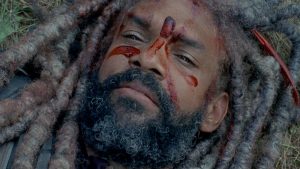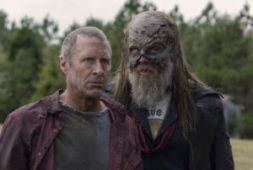
Do we decide who we ultimately become or do the circumstances of life determine it?
This was the deep existential question that King Ezekiel was pondering tonight right before all of his devastating losses. Not only did he lose most of the members of the Kingdom (I knew last week when he said that he hadn’t even lost one that bad things were about to happen), but he lost his irreplaceable pet tiger Shiva, who went out like a champ. (Is it bad that I was more sad about that than anyone else we have lost so far this season?)
Let’s face it, Ezekiel had a really bad day, and it makes complete sense that the day would start with some deep questions about why he created this whole charade in the first place.
Ezekiel’s speeches to his people, especially the, “And I still smile” speech, were great motivators for his people, but clearly they all knew that this whole kingdom stuff was just fiction. But as Jerry proved tonight, this was a fiction that his followers loved and chose out of their own free will. There was no coercion to join the kingdom.
At the end of the day, Ezekiel is still alive because his people literally threw their bodies between him and the bullets that wiped out what looked like about sixty members of the kingdom. Then Ezekiel’s loyal friend and warrior, Jerry, saved his life from Gunther, (the savior in Jeffrey Dahmer glasses) who called Ezekiel a “conman in a costume.” But as Jerry decided to take the last stand with his king, he hilariously thanked him “for being such a cool dude.” All fiction moved aside and we realized that the good guys genuinely cared for Ezekiel, while the bad guys really wanted to make an example of him.
Fortunately for all of them, Carol saved the day (and then in the coolest scene in the last three seasons, Rick and Daryl saved the day). But the whole episode was colored through the lens of the conversation about free will and determinism that happened between Ezekiel and Carol in this telling flashback scene.
Ezekiel: I am ready to become what I must.
Carol: To “become”?
Ezekiel: Yes. To will myself into what I must be. I was a zookeeper. I was meek. Those weekend matinees, those nights. And then, at work, a 500-pound tiger needed my help. And as she bled, I did not just leap into her enclosure. I was not seized by any deep-seated instinct. They were only a few seconds that passed, but I deliberated. I thought about doing it, weighing the risk of approaching such a beast. And I thought about not doing it. I stood there, considering who I’d be in either iteration. And I decided I wanted to be the one who leapt. So, many years later, Benjamin was the one who told me what I already knew, but couldn’t hear “If you’re asked to be the hero, be the hero.” I’m now ready. Finally. I’ve deliberated. I’ve made the decision on who I will be. (to Carol) Was it easier for you? Or have you always been this way? This strong? This brave? Or did you decide to be who you are today?
Carol: I decided. Just like you. But life decided some things, too.
Ezekiel: It does. It will.
Ezekiel is claiming that this whole thing was his choice. This was not something forced on him or something that he was born with. This was not an existence that was entirely determined by his genetics or the things that happened to him before or after the apocalypse. Ezekiel decided who he was going to be, and he was not just a victim of circumstance. And when he asks Carol about her opinion on these deep questions, I love her response, “I decided. Just like you. But life decided some things too.” Carol clearly has a uniquely balanced view on how the choices she has made have impacted her as well as the areas of her life which have in part determined her destiny.
While most discussions in life about free will or determinism happen in universities and seminaries, I found it particularly amusing that this one happened on a show about zombies and people who give speeches in Elizabethan English while standing next to their pet tiger. But that is exactly what I love about this show – they are not afraid to ask some of the big questions.
As a Christian and a pastor, this is something that I think about a lot. If there is a God who loves us all, why does He allow us to do such terrible things to each other? And if He didn’t allow us to do these things (in other words, if he limited our free will) what would life really look like? Imagine if God didn’t let us make our own choices and He made all of our choices for us. Is that the solution we want to solve most of the world’s problems? Probably not. Or, are there other more subtle things that determine who we are? Our genetic makeup? Our culture? Our upbringing? I do not know the answer to all of these questions.
However, one thing that I do know is that we can all make choices. Ezekiel is aware that he is a decider. Carol also knows that even though life has done some horrible things to her, she still makes her own decisions. Most of us (even determinists) all understand this basic reality – we have the freedom to make choices that are helpful to people, and we also have the freedom to make choices that are hurtful to people. So the big question here is who is responsible for these choices?
In the New Testament, Apostle Paul is constantly dealing with these questions. In one particular letter to a church in Galatia, Paul has to deal with this issue in detail. For this church, there is tension among the members that is both cultural and theological. Those who grew up following the Torah (the first five books of the Bible which are referred to as the Law), believed that the law was given as a restraint in order to keep people in line. It was like a fence around their lives that would keep them from doing terrible things. But then there were Gentile Christians who grew up with no restraints at all. They just did whatever they wanted, whenever they wanted.
But now that they were all Christians, they had a tension surrounding their free will. The work of Christ on the cross would make it so the bad things that they did (called sin) were forgiven. Paul also has made it very clear in most (if not all) of his writings that this “grace” given to them by the work on the cross was not the result of how good people were (works). It was a FREE gift from God. So of course the question of how we should all live under this grace was a significant one – and it still is.
Take a look at part of Paul’s letter to the Galatians.
13 For you have been called to live in freedom, my brothers and sisters. But don’t use your freedom to satisfy your sinful nature. Instead, use your freedom to serve one another in love. 14 For the whole law can be summed up in this one command: “Love your neighbor as yourself.” 15 But if you are always biting and devouring one another, watch out! Beware of destroying one another.
16 So I say, let the Holy Spirit guide your lives. Then you won’t be doing what your sinful nature craves. 17 The sinful nature wants to do evil, which is just the opposite of what the Spirit wants. And the Spirit gives us desires that are the opposite of what the sinful nature desires. These two forces are constantly fighting each other, so you are not free to carry out your good intentions. 18 But when you are directed by the Spirit, you are not under obligation to the law of Moses. (Galatians 5:13-18, NLT)
Paul is painfully aware that this new freedom from strict restraint has caused a variety of reactions. Some people just do whatever they want and then ask God for forgiveness, because they believe Jesus has given them freedom from responsibility (He hasn’t). Others work as hard as they can to follow the law (the parts of the Bible that instruct) and hold everyone else to those same standards. This naturally makes it easier for some to see themselves as better than others because of their extreme “holiness” (legalism). But this is the attitude that Jesus seemed to attack the most in the gospels (does anyone remember the Pharisees?).
The amazing thing about this passage is that Paul describes a third way. He acknowledges that continuing to live in sin is not okay (verse 13). But he also points out that following the law at all times is not really possible. Perfection is not really an option here because we have this thing called the “sin nature” (verse 16 and 17). So how are we to live? He says basically two things: focus on loving each other (the greatest commandment, see Mark 12:21) and allow the Holy Spirit to “guide our lives” (verse 16).
A few years ago, I had a conversation with a man who had just gotten out of prison. He had two strikes against him, which in California meant that if he committed another felony, he would end up in prison for life. He was really concerned about this and was afraid that he would eventually slip up and spend the rest of his life in prison. I told him that his dilemma was very similar to the Christian life. I told him that Jesus has freed us from the prison of sin and that we now have a choice as to what to do with that freedom. We can see it as an opportunity to commit more sins or we can see it as an opportunity to try to serve God and our neighbors (this is how Jesus summed up the law). If we see freedom simply as the removal of restraint, we will never be close to God. But if we see the freedom God gives us as the freedom to love Him and others, (by allowing the Holy Spirit to guide us), we can experience a whole new kind of life – one that according to Jesus (John 10:10) is “rich and satisfying.” That is the type of freedom we have when we accept Jesus and choose to make Him our King.
SEASON 8, EPISODE 4 DISCUSSION QUESTIONS:
1) What do you think Carol meant when she said “life has decided some things too?”
2) Do the choices that people make on The Walking Dead matter? Why or why not?
3) Can you think of choices that people have made on this show that have significantly affected the trajectory of people’s lives?
4) Are there instances in the show where you believe that choices didn’t matter at all? Life just “decided some things” for people?
5) In the book of Galatians, Paul seems to be talking to two different types of people: those who feel like they can do whatever they want and just ask forgiveness, and those who work as hard as they can to reach a sort of “holy” perfection. While neither is the right way to live, according to Paul, do you relate to one of these attitudes more than the other? Which one? Why?
6) The Christian dilemma is that we can’t be perfect, but we also need to try to be holy. How does Paul say that we can do this (look at Galatians 5:16)?
7) What command does Paul say summarizes the whole law (verse 14)? How do all other commands seem to be under this one? Why do you think that is?
8) Do you think that the choices you make really matter to those around you? To God?
9) What can you do to help you make better choices?
10) In what ways does God want you to strive for holiness in your life?
Thom McKee Jr. is a husband, father, pastor… and film geek (and brother of Jonathan McKee). Thom lives in Northern California with his wife and two kids.
Jonathan McKee
Jonathan McKee is the author of over twenty books including the brand new The Guy's Guide to FOUR BATTLES Every Young Man Must Face; The Teen’s Guide to Social Media & Mobile Devices; If I Had a Parenting Do Over; and the Amazon Best Seller - The Guy's Guide to God, Girls and the Phone in Your Pocket. He speaks to parents and leaders worldwide, all while providing free resources for youth workers on TheSource4YM.com. Jonathan, his wife Lori, and their three kids live in California.



